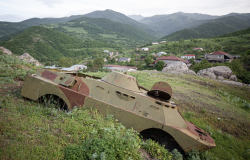Climate Security Heats Up
The effects of climate change have become increasingly linked to global security issues. The October cover story of Centerpoint looks at how the Environmental Change and Security Program has explored the threats and opportunities posed by the problem of climate change.

In December, tens of thousands of people from more than 170 countries will come together in Copenhagen for a landmark conference on climate change—"the most important gathering in human history," said Hilary Benn, the United Kingdom's state secretary for environment, at a Wilson Center meeting earlier this year. "An agreement on cutting emissions would be the biggest single step we could take to safeguard [natural] resources."
Over the last year, the Environmental Change and Security Program [ECSP] has delved into the serious effects of climate change and its links to global security issues.
In the developing world, the threats posed by climate change are already apparent, including degraded land, diminished water supplies, and strained energy resources. Benn highlighted the spiraling impact of climate change, population growth, and other stresses on agriculture, which has led to spikes in food prices and at times riots.
But even the developed world is not insulated from the problem. "We are literally not designed for environmental change," blogged Cleo Paskal, an associate fellow in Chatham House's Energy, Environment, and Development Programme, on ECSP's blog, New Security Beat. "Transportation systems, defensive capabilities, agriculture, power generation, water supply, and more are all designed for the specific parameters of their physical environments," she wrote. "That is why unplanned environmental change almost always has negative impacts."
A Matter of National Security
Climate change could negatively affect the U.S. military in several ways. "Climate change poses threats and opportunities that any risk analysis calculation should take seriously—including the military's planning efforts, such as the Quadrennial Defense Review," ECSP Director Geoff Dabelko writes in the journal Climatic Change. Disasters related to climate change could increase the number of relief and humanitarian missions the military conducts at home and abroad; inundate low-lying military bases, ports, and other infrastructure; and exacerbate existing conflicts connected to natural resources and livelihoods.
During a May 28 meeting titled, "Energy, Climate Change, and the Military: Implications for National Security," General Charles Wald, a retired U.S. Air Force flag officer, said, "Force protection isn't just about protecting weak spots," he said. "It's about reducing vulnerabilities before you get into harm's way."
The CNA Corporation's Military Advisory Board, of which Wald is a member, recommends that military planners adopt energy-security and climate change goals, and that the Department of Defense design and deploy energy-efficient systems on the battlefield.
The Threat Multiplier
Climate change is predicted to spur conflict across the globe, from the melting ice of the Arctic to the arid deserts of Darfur. "It's a threat multiplier," said Nick Mabey, founding director and chief executive of E3G, at a climate-security roundtable earlier this year.
"It will make unstable places less stable. It's going to change strategic interests, alliances, borders, threats, economic relationships, comparative advantages, the nature of international relations, and the legitimacy of the UN."
Mabey said the European Union is integrating climate change into its security strategy, with Great Britain, Germany, and Denmark taking the lead. In particular, security experts are examining trade routes, maritime zones, and new access to resources in the most northern ocean. "The Arctic is by far the most important climate-security issue in the minds of traditional foreign policy types in Europe," said Mabey.
Forty-six countries are at high risk of violent conflict due to the intersecting effects of climate change and economic, political, and social problems, said International Alert Secretary General Dan Smith at a June 10 event on climate adaptation in fragile states. However, "I don't know of an armed conflict that has a single cause," he said. "Our argument is simply that climate change adds another major variable into that mix."
A Caution on "Climate Refugees"
Clionadh Raleigh, a lecturer at Trinity College in Dublin, warned that fears of mass migrations of people crossing international borders to escape the ravages of climate change are overplayed. Speaking at the climate-security roundtable, she said, "Individuals and communities have quite a lot of coping mechanisms to deal with ecological difficulty," including migration from rural to urban areas. She said evidence does not support an increase in international migration in response to ecological change, although "there is evidence that there will be an increase in internal migration."
Smith said that much of that migration will be people moving from areas that are not viable into areas which are barely viable, "where their arrival threatens the viability of the area into which they are moving." However, he urged the audience to be wary of the "factoids and guesstimates being thrown around about how many people will migrate under the pressure of climate change."
Climate Security Yes, Climate Wars No
ECSP Director Dabelko warns against similar overstatements, such as "climate will cause chaos," that oversimplify its links to conflict. "The increasing attention given climate change's potential security implications is a positive development," Dabelko told Centerpoint. "The challenge is to avoid making climate security just a political slogan where advocates oversell our understanding of the links, as happened to environmental security in the mid-1990s."
In the most recent issue of the Environmental Change and Security Program Report, Dabelko writes that the increasingly popular assertion that the genocide in Darfur is solely caused by climate change "ignores political and economic motivations for the fighting—and can be perceived as a way to let the regime in Khartoum off the hook."
Dabelko offers some advice to scientists, politicians, and the media in an op-ed in the Bulletin of the Atomic Scientists. He advises: Don't oversimplify the links between climate change and violent conflict or terrorism; don't neglect ongoing natural resource and conflict problems; don't assume we know the precise scale and location of climate-induced migration, and don't forget that climate mitigation efforts can introduce social conflict.
"There is a new opportunity to use increased public attention to highlight the relationship between natural resources, climate, and security," Dabelko writes. "But redressing the climate-security link requires avoiding some of the pitfalls that impeded progress the last time environment and security shared the spotlight."
Changing the Climate with China's Military
On the positive side, climate change also provides an opportunity for military-to-military environmental cooperation. For nearly two decades, the U.S. military has used environmental engagement to reduce tensions and improve relations with both adversaries and friends.
Writing in the Christian Science Monitor, Dabelko and the U.S. Army War College's Kent Butts argue that climate could be one of the most productive avenues for improving military relations with China, which has just surpassed the United States as the world's largest emitter of carbon dioxide.
"Deeper environmental engagement with China would capitalize on both militaries' prior experience," write Dabelko and Butts. "U.S. and Chinese militaries should jointly assess the security implications of climate change that concern both sides: rising sea levels, changing precipitation patterns, uncertain migration scenarios, and instability in resource-rich regions."
They also suggest that joint training exercises could prepare both forces for coping with disasters, and joint research programs could improve fuel efficiency and alternative energy supplies. "Lowering the temperature of this relationship would vastly improve not only our ability to adapt to rising sea levels, but also to avoid dangerous incidents in midair or on the high seas," they write.
Done wrong, "climate wars" hyperbole could lead to misdirected policies, misspent funds, and international misunderstandings. Done right, international cooperation around climate change could help build confidence and inspire peace among nations.
Related Links
About the Author


Environmental Change and Security Program
The Environmental Change and Security Program (ECSP) explores the connections between environmental change, health, and population dynamics and their links to conflict, human insecurity, and foreign policy. Read more










